 |
| NetLab · Rules · Torrent Tracker · Have a problem? · Eng/Rus |
 Help Help
 Search Search
 Members Members
 Gallery Gallery
 Calendar Calendar
|
| Welcome Guest ( Log In | Register | Validation ) | Resend Validation Email |
|
Posted: 02-02-2009, 23:03
(post 1, #878054)
|
||||||||||||||||||
|
Pro Member Group: Members Posts: 695 Warn:0% |
The Choir of Wakefield Cathedral Music for Holy Communion "Heaven and Earth are full of thy Glory" Label: Priory, PRCD 5030 Year: 1990 Composers: Basil Harwood John Ireland Charles Wood Harold Edwin Darke George Oldroyd Kenneth Leighton Performers: Keith Wright - organ The Choir of Wakefield Cathedral Jonathan Bielby - conductor The Priory label is a noted champion of recorded choral and organ music. This release of performances from Wakefield Cathedral in 1990 forms an attractive disc of Music for Holy Communion from six English-based composers. The first work is by Basil Harwood an organist and composer who was born in Gloucester in 1859. A Charterhouse pupil Harwood studied at Trinity College, Oxford before travelling to the Leipzig Conservatory for lessons from Carl Reinecke and Salomon Jadassohn. In 1883 Harwood was appointed organist at St. Barnabas Church, Pimlico, London, then at Ely Cathedral in 1887 before finally settling as organist at Christ Church, Oxford between 1892-1909. The earliest composed score on the disc, the Communion Service in A Flat major was composed by Harwood in 1892. One is immediately struck by the generally exalted nature of this highly efficiently rendered Service. The Gloria is primarily contemplative with a powerful Sanctus and a moving Benedictus. Light and reverential the Agnus Dei gently fades away with significant intimacy. The Cheshire-born composer John Ireland entered the Royal College of Music (RCM) in 1893 studying with Sir Charles Stanford and Sir Walter Parratt. Ireland became the youngest ever Fellow of the Royal College of Organists and served as assistant organist at Holy Trinity Church, Sloane Street in London. He taught composition at the RCM from 1923-1939; his most notable pupils being Benjamin Britten and E.J. Moeran with several others including Richard Arnell, Alan Bush and Humphrey Searle achieving a degree of success. From 1904 Ireland was appointed organist and choirmaster at St Luke’s Church in Chelsea, London where he served for twenty-two years. Composing a considerable amount of sacred music throughout his career Ireland wrote his Communion Service in C major in 1913 with the gentle Kyrie that opens the score added later in 1941. Ireland dedicated his Communion Service to his vicar and choir at St Luke’s Church in Chelsea. A highlight is the opening Gloria containing drama and passion and one is aware how the solo voices add to the variety of the attractive Creed. The Sanctus and Benedictus movement is indelibly poignant with colourful textures. Controlled and gently expressive the closing Agnus Dei is interpreted with assurance by this strong and disciplined choir. Armagh-born in 1883 Charles Wood became one of the inaugural class of fifty students at the newly instituted RCM. There he studied with professors Stanford and Parry. In 1883 Wood was awarded an organ scholarship to Selwyn College, Cambridge later transferring across the city to Gonville and Caius College. Appointed as a teacher at the RCM in 1888 Wood the next year became a lecturer at Caius College. For several years he served as assistant conductor to Stanford with the Cambridge University Musical Society. After Stanford’s death in 1824 Wood was appointed as professor of music at Cambridge serving in the role for only two years until his death in 1926. In a respected teaching career Wood’s most notable pupils were Ralph Vaughan Williams and Herbert Howells. Wood composed prolifically in many genres but is principally recognised today as a composer of sacred music for the Anglican church. The Short Communion Service in The Phrygian Mode for unaccompanied choir was composed by Wood in 1919. Sung with remarkable intimacy and exquisite diction the Short Service is an essentially contemplative and deeply spiritual work. One notices the general lack of sharp or harshly dynamic and rhythmic contrasts. Harold Darke was born in London in 1888. When aged only fourteen he entered the RCM studying with Stanford and Parratt for seven years. Darke in 1906 was appointed as organist at the Emmanuel Church in West Hampstead, London subsequently moving across the city to serve at St. James Church, Paddington and then from 1916 to St Michael’s Church, Cornhill, in the City of London. At St. Michael’s, Cornhill, Darke achieved recognition for his Monday lunchtime recitals of which more than 1,800 were given over his remarkable fifty tenure. In 1941 Darke was appointment organist of King’s College, Cambridge temporarily during Boris Ord’s absence on war service. Appointed to professor at the RCM, he achieved a remarkable tenure of over sixty years. From Darke’s relatively small output his Communion Service in F major was composed in 1926 for St Michael’s. The Service is regarded as one of the finest settings by an English composer in the twentieth century. With dignified singing of admirable unison throughout the Gloria is a robust and dramatic supplication for God’s mercy. The Creed is expressive, containing significant variety and the two final movements the Sanctus and Benedictus and the closing Agnus Dei are beautiful and intimate expressions of faith. The English-born organist and composer George Oldroyd from 1919 became organist at the Holborn, St. Alban’s Church in London. A year later Oldroyd was appointed to St. Michael’s Church in Croydon where he served as organist until his death in 1956. Of the several masses that Oldroyd composed he is best remembered today for his Mass of the Quiet Hour from 1928. The work was dedicated to Cosmo Gordon Lang who later became Archbishop of Canterbury. The opening Kyrie has a splendid and lofty sense of expression and the refined singing of the Gloria is splendidly conveyed. I enjoyed the smooth and atmospheric quality to the Sanctus and Benedictus movement and the assured vocal writing of the closing Agnus Dei educes outstanding choral singing with expressively sympathetic solo contributions. The disc closes with Kenneth Leighton’s Missa Brevis (1968). Leighton was a prolific composer of over a hundred published works. Born in Wakefield, England in 1947 Leighton started his music career as a chorister at Wakefield Cathedral. He won a scholarship to Queen’s College, Oxford graduating in 1951 having studied with Bernard Rose. The same year he won a Mendelssohn Scholarship and studied in Rome with Goffredo Petrassi. In 1952 Leighton became a professor at the Royal Marine School of Music and a Gregory Music Fellow at Leeds University in 1953-56. In 1956 he lectured in Music at the Edinburgh University returning in 1968 to Oxford at Worcester College. Leighton was in 1970 appointed to the prestigious post of Reid Professor of Music at Edinburgh University holding the position until his death. Leighton’s Missa Brevis from 1968 was written for Liverpool Cathedral. As the most recently composed score on the disc it has, not surprisingly, a contemporary sacred feel. The opening Kyrie has a broad dynamic and is elegant with a hint of mystery, splendidly conveyed with incandescent singing. Adventurously challenging sacred writing in the Gloria in which the poised choir could hardly be more impressive. I was struck by the controlled and passionate incisiveness of the Sanctus and Benedictus movement. At times in the closing movement Agnus Dei I sensed an atmospheric sound-world similar to that of Estonian composer Arvo Part. This is expressive music that conveys a strong sense of eternity. I was surprised that the ecstatic choral climax that I was expecting never happened. Jonathan Bielby and his splendid Wakefield Cathedral Choir may never make a better recording, transporting the listener with them in this beautiful sacred music. The splendid choir is fresh-voiced, conveying an appropriate degree of reverence combined with a moving touch of vulnerability. There are occasional moments where individual voices are prominent at the expense of choral unison but this is only a minor observation that never detracts from the enjoyment. The acoustic at Wakefield Cathedral is coolly atmospheric with vividly clear words. Keith Wright is a sympathetic organist who is never obtrusive. On the downside, I found the essay in the booklet disjointed and largely unhelpful. This is a most attractive and welcome release. Michael Cookson Tracklist: Communion Service in A Flat (1892) Basil Harwood (1859-1949) 01. Gloria (3:51) 02. Sanctus and Benedictus (4:10) 03. Agnus Dei (1:43) Communion Service in C (1913. Kyrie 1941) John Ireland (1879-1962) 04. Kyrie (1:13) 05. Gloria (3:04) 06. Creed (4:21) 07. Sanctus and Benedictus (2:52) 08. Agnus Dei (2:39) Short communion Service in The Phrygian Mode (1919) Charles Wood (1866-1926) 09. Kyrie (2:13) 10. Gloria (3:44) 11. Sanctus and Benedictus (1:56) 12. Agnus Dei (1:28) Communion Service in F (1926) Harold Darke (1888-1976) 13. Gloria (2:59) 14. Creed (5:11) 15. Sanctus and Benedictus (2:50) 16. Agnus Dei (1:47) Mass of the Quiet Hour George Oldroyd (1893-1956) 17. Kyrie (2:27) 18. Gloria (2:52) 19. Sanctus and Benedictus (2:15) 20. Agnus Dei (2:20) Missa Brevis (1968) Kenneth Leighton (1929-1988) 21. Kyrie (2:29) 22. Gloria (3:11) 23. Sanctus and Benedictus (3:01) 24. Agnus Dei (3:39)   LOG
This post has been edited by kgkk on 02-02-2009, 23:05 |
||||||||||||||||||
|
|||||||||||||||||||


Powered by Invision Power Board v1.3.1 Final.

